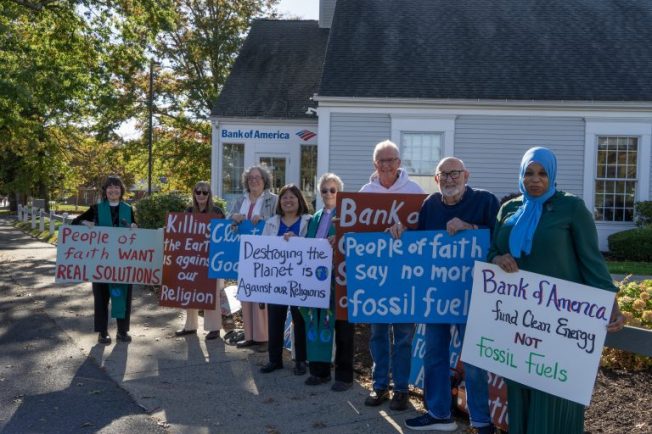
Rev. Margaret Bullitt-Jonas and friends at an Interfaith Action at Bank of America, calling on the bank to stop funding fossil fuels. Photo Credit: Robert A. Jonas
As the United Methodist liaison to Third Act Faith’s Faithful Banking Subcommittee, I am trying to get the word out to United Methodists around the country about Third Act Faith and the Banking on Our Future Campaign. My article, “Climate Change and Faithful Banking,” was published on January 4 by United Methodist Insight, a national newsletter. It interprets the Campaign from a Methodist perspective.
I live near Nevada City, a small town in the foothills of Northern California. I am pulling together a Third Act Faith group for a March 21 Banking on Our Future local action by reaching out to members of my denomination, speaking to pastors and some of the people I know in the three nearby United Methodist churches, and by reaching out through our local nonprofit, Earth Justice Ministries, which works with people from varied faith traditions.
Asking someone to pledge to change their bank is a big ask, especially in this time of direct deposits and automatic payments, so it’s important for me to know and acknowledge what it involves. But as the climate stakes become ever-higher, it is a way to take moral responsibility not just for what we fund with our income, but also with our assets. I’ll be talking up this campaign until the March 21st day of action, hoping to inspire a few people to join us here in my community or elsewhere.
I recently found out that there are members of Elders Climate Action in our community who are planning to coordinate with Third Act’s Banking on Our Future Campaign, so our interfaith Third Act Faith group will participate as a contingent in the larger coalition action. We will identify ourselves by wearing or carrying identifying symbols of our faiths; clergy may choose to wear vestments. We will carry a colorful banner that says “Third Act Faith.”
Our group will work with whatever other groups participate and help to create an inclusive action that is respectful and effective. We will notify the local bank (or banks) and set up a meeting with the bank manager and let them know in advance that we will be there on 32123. At the meeting, we will tell the manager why and when we will come and exactly what nonviolent, respectful action we will take: a peaceful demonstration outside, songs, banners, flyers, with some members of our group coming in to close their accounts. We may accompany some of them to one of the local banks or credit unions that do not fund fossil fuels (so far, we have identified two).
Members of our group will notify the press and write letters to the editor or opinion pieces for our local papers in advance. We’ll get lots of pictures, try to get publicity in advance and on the day of the event, and help the movement gain momentum so that people will become aware of the problem of banks funding fossil fuels. I have done similar actions in the past, and I expect it to go well. The managers may close the banks if they know we are coming, or the actions may proceed as we have planned. However it goes, we will have done our part.



